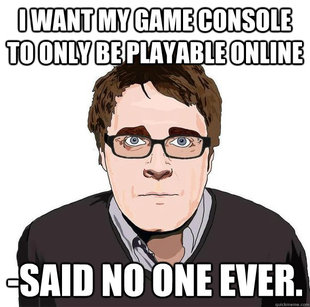It's been kinda weird, seeing the Linux Foundation slowly transform into an organization that is fundamentally opposed to the license Linux is published under.
But the Linux Foundation is in the business of turning a profit, and that's meant embracing corporate America -- even Microsoft is now a member. In fact, the board is overwhelmingly made up of corporate representatives now: Facebook, AT&T, Qualcomm, Cisco, VMware (we'll come back to them tomorrow), Intel, HP, Bitnami, Panasonic, Hitachi, Samsung, IBM, Microsoft (Microsoft!), Comcast, Huawei, NEC, Oracle, Fujitsu. There used to be two community representatives on the board, but they eliminated that position (we'll come back to that on Thursday).
Linux is published under the GNU General Public License. The GPL is what GNU/Free Software Foundation founder Richard Stallman calls "copyleft": if a piece of software is licensed under the GPL, then that means anyone else is free to access, modify, and redistribute the source code, provided that if they release a modified version, they publish it under the same license.
Corporations don't much like copyleft or the GPL. They like more permissive licenses, like the MIT License and the BSD Licenses, which allow them to take someone else's code, modify it, and not give their modifications back to the community.
Linus Torvalds, the man who the Linux Foundation is named after, gets this. FOSS Force's Christine Hall recounts his remarks at LinuxCon last year:
“I think that if you actually want to create something bigger, and if you want to create a community around it, the BSD license is not necessarily a great license,” he said.
“I mean, it’s worked fairly well, but you are going to have trouble finding outside developers who feel protected by a big company that says, ‘Hey, here’s this BSD license thing and we’re not making any promises because the copyright allows us to do anything, and allows you to do anything too.’ But as an outside developer, I would not get the warm and fuzzies by that, because I’m like, ‘Oh, this big company is going to take advantage of me,’ while the GPL says, ‘Yes, the company may be big, but nobody’s ever going to take advantage of your code. It will remain free and nobody can take that away from you.’ I think that’s a big deal for community management.
“It wasn’t something I was planning personally when I started, but over the years I’ve become convinced that the BSD license is great for code you don’t care about. I’ll use it myself. If there’s a library routine that I just want to say ‘hey, this is useful to anybody and I’m not going to maintain this,’ I’ll put it under the BSD license.
“Whenever licenses come up, I want to say that this is a personal issue,” he continued, adding a disclaimer most likely meant mainly for the benefit of the BSD folks, some of whom resent Linux’s success, but also to appease big enterprise, which is where the Linux Foundation gets virtually all of it’s funding.
“Some people love the BSD license,” he said. “Some people love proprietary licenses, and do you know what? I understand that. If you want to make a program and you want to feed your kids, it used to make a lot of sense to say that you want to have a proprietary license and sell binaries. I think it makes less sense today, but I really understand the argument. I don’t want to judge, I’m just kind of giving my view on licensing.”
Jim Zemlin, Executive Director of the Linux Foundation, seems to feel a little bit differently. Hall quotes him, in an article titled The Linux Foundation: Not a Friend of Desktop Linux, the GPL, or Openness:
“The most permissive licenses present little risk and few compliance requirements. These licenses include BSD and MIT, and others, that have minimal requirements, all the way to Apache and the Eclipse Public License, which are more elaborate in addressing contributions, patents, and indemnification.
“In the middle of the spectrum are the so-called ‘weak viral licenses’ which require sharing source code to any changes made to the originally licensed code, but not sharing of other source code linked or otherwise bound to the original open source code in question. The most popular and frequently encountered licenses in this category are the Mozilla Public License and the Common Public Attribution License.
“Restrictive Licenses present the most legal risk and complexity for companies that re-distribute or distribute software. These licenses are often termed ‘viral’ because software combined and distributed with this licensed software must be provided in source code format under the terms of those licenses. These requirements present serious risks to the preservation of proprietary software rights. The GNU General Public License is the archetype of this category, and is, in fact, the most widely used open source license in the world.”
Hall adds, "While his points are accurate enough, and reflect what I’ve already written in this article, the terms he uses suggest that the foundation holds the GPL and other copyleft licenses in contempt."
So what's all that got to do with the Software Freedom Law Center filing to have the Software Freedom Conservancy's trademark terminated? Nothing, insist the Linux Foundation and the SFLC. But Bruce Perens -- who founded the Linux Standard Base, one of the organizations that became the Linux Foundation -- thinks it's retaliation for a GPL enforcement lawsuit against VMware.
But that's a story for another post. Or two...

